最新初中英语语法情态动词讲课讲稿
- 格式:doc
- 大小:63.50 KB
- 文档页数:24
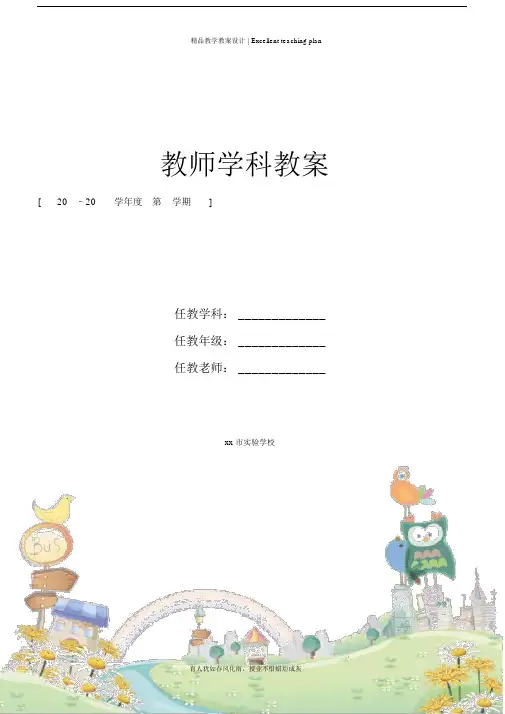
精品教学教案设计| Excellent teaching plan教师学科教案[ 20–20学年度第__学期]任教学科: _____________任教年级: _____________任教老师: _____________xx市实验学校精品教学教案设计| Excellent teaching plan 初中英语语法教学微课教案(情态动词can 和 could )汤山中学彭胜芳教学思路 :本节课我教的是情态动词can 和 could 作“能力”解时的区别。
这节课我打算通过复习以前学过的情态动词can 的用法,以及通过做游戏,让学生在轻松愉快的氛围中掌握can 的用法,以及了解can 和 could 的区别。
一、 Teaching Content:Unit 3Can you play the guitar?Grammar:Using “can”/“could” to talk about ability二、 Teaching Aims:e can talk about the ability at present.e could talk about ability in the past.三、 Teaching Key and Difficult Points:Howto use “can”and “could ”to express ability in the present and past.四、 Teaching Methods:Task-Based Language Teaching Method五、 Teaching Procedures:Step 1 :Warming upTask 1: RevisionT: What can you do now?精品教学教案设计| Excellent teaching planS1: I can sing.S2: I can drawS3: I can dance.T:Can you ride a bike / swim / fly a kite / play football/play chess?Ss:Yes , I can. / No, I can’t.Task 2: Playing a gameT: Now let us play a game. Five students come to the front and perform for the class according to my instructions.and gestures.The others answer my questions.T : What can she do?Ss : She can ride a bike /swim/ fly a kite/ play football/ play chess .T: Can she swim/ fly a kite/play football /play chess.Ss: Yes ,She can? No, she can’t.T: Say the whole sentences:eg: A can ride a bike.He can ’t / cannot swim.Step 2: PresentationT: Can you ride a bike now?S1:Yes. I canT:-Could you ride a bike five years ago ?-Yes, I could./ No, I couldn’t( Help him answer)S1:Yes, I could./ No, I couldn’t.T: we can use“could” t talk about the paste.g I can play computer now .But, last year I couldn’tplay.T: Could you row a boat last year?S1:Yes I could . No, I couldn’t.T: Could she he row a boat last year?( Ask other students)Ss: Yes she he could . No she he couldn’tT:Yes , A could ride a bike five years ago.He couldn ’t swim five years ago.(Teach the students to say the whole sentences):A could ride a bike five years ago.He couldn ’t swim five years ago.)(Ask other students in the same ways)Step 3:Practice :work in pairsT: Ask your partner more questionseg: Could he / she⋯?(Yes, he / she could. / No, he / she couldn’t.) ...Step4: ProductionTask 3: ExplanationT: Let ’s work out the rule.①肯定句式 : can\ could②否定句式 : can ’t\ couldn’t③疑句式 : Can⋯?\Could⋯?T: Wecan use “am(is , are) able to “ instead of “can”,and “was (were) able to“ instead of“could“.eg. ①Mike can sing more than 20 English songs.Mike is able to⋯②S he could speak English when she was four.She was able to⋯T:Please give more examples.to practice them.Step 5: SummaryT:In this class, we have learnt the use of can and could about talking about abilities .Who knows the differences between “can” and“could ”Step 6:HomeworkFinish off the practice on the workbooks ,Fill in the blank with can/could。
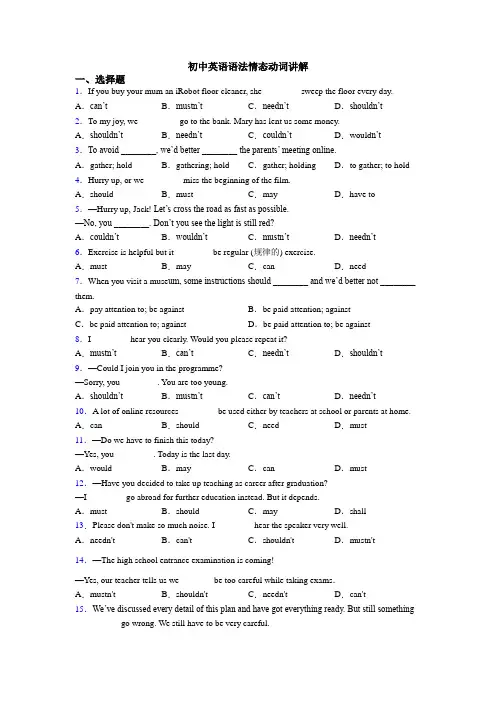
初中英语语法情态动词讲解一、选择题1.If you buy your mum an iRobot floor cleaner, she ________ sweep the floor every day. A.can’t B.mustn’t C.needn’t D.shouldn’t2.To my joy, we_________ go to the bank. Mary has lent us some money.A.shouldn’t B.needn’t C.couldn’t D.would n’t3.To avoid ________, we’d better ________ the parents’ meeting online.A.gather; hold B.gathering; hold C.gather; holding D.to gather; to hold 4.Hurry up, or we ________ miss the beginning of the film.A.should B.must C.may D.have to 5.—Hurry up, Jack! Let’s cross the road as fast as possible.—No, you ________. Don’t you see the light is still red?A.couldn’t B.wouldn’t C.mustn’t D.needn’t 6.Exercise is helpful but it ________ be regular (规律的) exercise.A.must B.may C.can D.need7.When you visit a muse um, some instructions should ________ and we’d better not ________ them.A.pay attention to; be against B.be paid attention; againstC.be paid attention to; against D.be paid attention to; be against8.I ________ hear you clearly. Would you please repeat it?A.mustn’t B.can’t C.needn’t D.shouldn’t 9.—Could I join you in the programme?—Sorry, you ________. You are too young.A.shouldn’t B.mustn’t C.can’t D.needn’t10.A lot of online resources ________ be used either by teachers at school or parents at home. A.can B.should C.need D.must11.—Do we have to finish this today?—Yes, you ________ . Today is the last day.A.would B.may C.can D.must 12.—Have you decided to take up teaching as career after graduation?—I ________ go abroad for further education instead. But it depends.A.must B.should C.may D.shall 13.Please don't make so much noise. I ________ hear the speaker very well.A.needn't B.can't C.shouldn't D.mustn't 14.—The high school entrance examination is coming!—Yes, our teacher tells us we _______ be too careful while taking exams.A.mustn't B.shouldn't C.needn't D.can't15.We’ve discussed every detail of this plan and have got everything ready. But still something __________ go wrong. We still have to be very careful.A.must B.should C.would D.may 16.—Ready? Let’s get started, Martin.— Swimming? I just ________ get used to it in winter.A.can’t B.needn’t C.mustn’t D.shouldn’t 17.—Will your mother be at home this Saturday?—Hard to say. She _______go to the countryside to see my grandparents.A.must B.may C.can D.would18.Think twice before making a decision, or you __________ get into trouble.A.may B.can't C.shouldn't D.mustn't 19.Don’t cross the road until the traffic lights turn green. A car_______hit you.A.need B.may C.should D.must20.— Mom, must I clean my room now?— No, you ________. You can do it after dinner.A.needn’t B.mustn’t C.shouldn’t D.can’t 21.—Seventy dollars for such a dress! You ________ be joking!—I’m serious. It’s made of silk from Hangzhou.A.must B.need C.will D.can 22.According to the rule, used batteries ________ be dropped in the red bin for harmful wastes. A.may B.would C.should D.might 23.—Must I finish all my homework today, Mum?—No, you ________, my dear. You can finish some tomorrow if you like.A.needn’t B.shouldn’t C.can’t D.mustn’t 24.—Suzy described every detail of the accident just now.—Her memory ________ be completely back.A.shall B.need C.must D.could25.—Is that Mr Zhou?—It ________ be him. He has gone to Beijing.A.can B.may C.can’t D.shouldn’t 26.Most young people like shopping online because they ________ spend much time going from shop to shop.A.needn’t B.can’t C.mustn’t D.shouldn’t 27.—Will Jim come to Yangzhou for a holiday?—He ________come and it depends on how much homework he will have.A.may B.should C.must D.need28.—In China, many parents complain that their children have to stay up late to do the homework.—Don’t worry. The government has realized the problem. I’m sure there ________ be good news soon.A.can B.should C.need D.must 29.—Who i s singing next door? It sounds like a young girl’s voice.—It _________ be Jane. But she seldom sings English songs.A.need B.must C.may D.can30.—Is it usually warm in Yancheng in May?—Yes. But it _______ be rather cold sometimes.A.must B.should C.would D.can31.A hard-working man ________ become a great scientist, but a great scientist ________ be a hard-working man.A.can’t; can B.may not; must C.can’t; must D.may not; can 32.Look at the floor, Tom! ________ you watch TV while having a meal?A.Should B.Could C.Must D.May33.Cars ________ give way to walkers on some roads in Binhai, or the drivers will be fined. A.may B.will C.can D.must34.Mr. Black ________ be at home now. He went abroad on vacation last Friday.A.can’t B.mustn’t C.needn’t D.shouldn’t 35.For the safety of the passengers, objects like guns ________ be carried on board.A.may not B.needn’t C.might not D.mustn’t 36.— What do you think of the show yesterday?— Some of them were really good but others ________ be better.A.will B.must C.need D.can 37.—Who’s the man over there? Is that Mr. Black?—It ________ be him. Mr. Black is much taller than that man.A.may B.must C.can’t D.mustn’t 38.You ________ drive after drinking alcohol(酒). It’s against the law.A.mustn’t B.needn’t C.couldn’t D.w ouldn’t 39.It’s of great importance to protect the environment. Each of us ________ take an active part in it.A.can B.may C.would D.should40.I think all the students love the weekends because, to them, they ________ get up early on Saturdays or Sundays.A.mustn’t B.don’t need C.needn’t D.can’t【参考答案】一、选择题1.C解析:C【详解】句意:如果你给你妈妈买一台扫地机器人,她就不必每天扫地了。
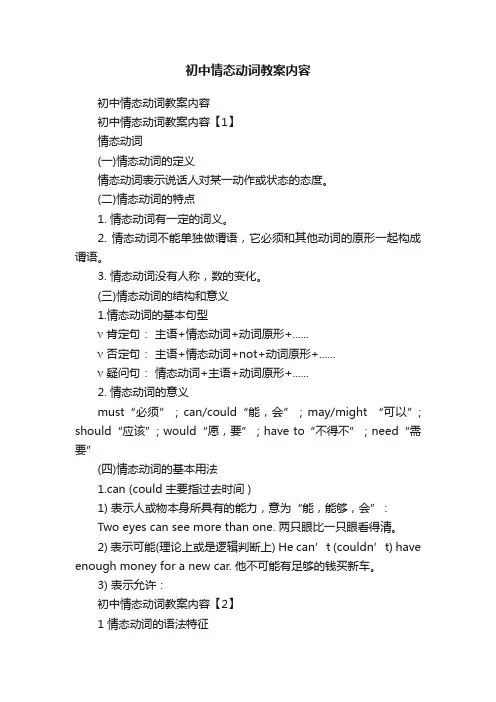
初中情态动词教案内容初中情态动词教案内容初中情态动词教案内容【1】情态动词(一)情态动词的定义情态动词表示说话人对某一动作或状态的态度。
(二)情态动词的特点1. 情态动词有一定的词义。
2. 情态动词不能单独做谓语,它必须和其他动词的原形一起构成谓语。
3. 情态动词没有人称,数的变化。
(三)情态动词的结构和意义1.情态动词的基本句型ν肯定句:主语+情态动词+动词原形+......ν否定句:主语+情态动词+not+动词原形+......ν疑问句:情态动词+主语+动词原形+......2. 情态动词的意义must“必须” ; can/could“能,会” ; may/might “可以”; should“应该”; would“愿,要” ; have to“不得不” ; need“需要”(四)情态动词的基本用法1.can (could主要指过去时间 )1) 表示人或物本身所具有的能力,意为“能,能够,会” :Two eyes can see more than one. 两只眼比一只眼看得清。
2) 表示可能(理论上或是逻辑判断上) He can’t (couldn’t) have enough money for a new car. 他不可能有足够的钱买新车。
3) 表示允许:初中情态动词教案内容【2】1 情态动词的语法特征1) 情态动词不能表示正在发生或已经发生的事情,只表示期待或估计某事的发生。
2) 情态动词除ought 和have 外,后面只能接不带to 的不定式。
3) 情态动词没有人称,数的变化,即情态动词第三人称单数不加-s。
4) 情态动词没有非谓语形式,即没有不定式,分词,等形式。
2 比较can 和be able to1)can could 表示能力;可能 (过去时用could),只用于现在式和过去式(could)。
be able to可以用于各种时态。
They will be able to tell you the news soon. 他很快就能告诉你消息了。

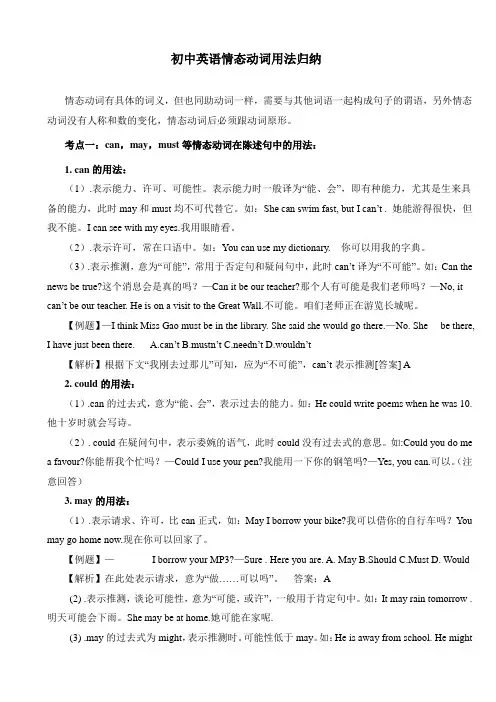
初中英语情态动词用法归纳情态动词有具体的词义,但也同助动词一样,需要与其他词语一起构成句子的谓语,另外情态动词没有人称和数的变化,情态动词后必须跟动词原形。
考点一:can,may,must等情态动词在陈述句中的用法:1. can的用法:(1).表示能力、许可、可能性。
表示能力时一般译为“能、会”,即有种能力,尤其是生来具备的能力,此时may和must均不可代替它。
如:She can swim fast, but I can’t . 她能游得很快,但我不能。
I can see with my eyes.我用眼睛看。
(2).表示许可,常在口语中。
如:You can use my dictionary. 你可以用我的字典。
(3).表示推测,意为“可能”,常用于否定句和疑问句中,此时can’t译为“不可能”。
如:Can the news be true?这个消息会是真的吗?—Can it be our teacher?那个人有可能是我们老师吗?—No, it can’t be our teacher. He is on a visit to the Great Wa ll.不可能。
咱们老师正在游览长城呢。
【例题】—I think Miss Gao must be in the library. She said she would go there.—No. She __be there, I have just been there. A.can’t B.mustn’t C.needn’t D.wouldn’t【解析】根据下文“我刚去过那儿”可知,应为“不可能”,can’t表示推测[答案] A2. could的用法:(1).can的过去式,意为“能、会”,表示过去的能力。
如:He could write poems when he was 10. 他十岁时就会写诗。
(2). could在疑问句中,表示委婉的语气,此时could没有过去式的意思。
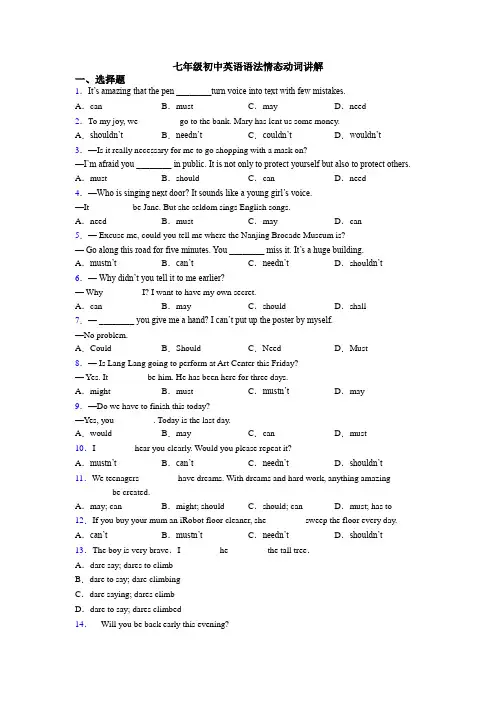
七年级初中英语语法情态动词讲解一、选择题1.It’s amazing that the pen ________turn voice into text with few mistakes.A.can B.must C.may D.need2.To my joy, we_________ go to the bank. Mary has lent us some money.A.shouldn’t B.needn’t C.couldn’t D.wouldn’t 3.—Is it really necessary for me to go shopping with a mask on?—I’m afraid you ________ in public. It is not only to protect yourself but also to protect others. A.must B.should C.can D.need 4.—Who is singing next door? It sounds like a young girl’s voice.—It _________ be Jane. But she seldom sings English songs.A.need B.must C.may D.can5.— Excuse me, could you tell me where the Nanjing Brocade Museum is?—Go along this road for five minutes. You ________ miss it. It’s a huge building. A.mustn’t B.can’t C.needn’t D.shou ldn’t 6.—Why didn’t you tell it to me earlier?— Why ________ I? I want to have my own secret.A.can B.may C.should D.shall7.—________ you give me a hand? I can’t put up the poster by myself.—No problem.A.Could B.Should C.Need D.Must8.— Is Lang Lang going to perform at Art Center this Friday?— Yes. It ________ be him. He has been here for three days.A.might B.must C.mustn’t D.may9.—Do we have to finish this today?—Yes, you ________ . Today is the last day.A.would B.may C.can D.must10.I ________ hear you clearly. Would you please repeat it?A.mustn’t B.can’t C.needn’t D.shouldn’t 11.We teenagers ________ have dreams. With dreams and hard work, anything amazing________ be created.A.may; can B.might; should C.should; can D.must; has to 12.If you buy your mum an iRobot floor cleaner, she ________ sweep the floor every day. A.can’t B.mustn’t C.needn’t D.shouldn’t 13.The boy is very brave.I ________ he ________ the tall tree.A.dare say; dares to climbB.dare to say; dare climbingC.dare saying; dares climbD.dare to say; dares climbed14.---Will you be back early this evening?---Yes, but I ________ be a little late. Our boss sometimes has extra work for us.A.may B.must C.need D.will15.You ______ pay too much attention to your pronunciation, as it is so important in the oral (口头的) test.A.shouldn’t B.mustn’t C.can’t D.needn’t 16.—Ready? Let’s get started, Martin.— Swimming? I just ________ get used to it in winter.A.can’t B.needn’t C.mustn’t D.shouldn’t 17.—Will your mother be at home this Saturday?—Hard to say. She _______go to the countryside to see my grandparents.A.must B.may C.can D.would18.Think twice before making a decision, or you __________ get into trouble.A.may B.can't C.shouldn't D.mustn't 19.Don’t cross the road until the traffic l ights turn green. A car_______hit you.A.need B.may C.should D.must 20.—Where is Tom? I am considering ________ him about the result of the exam.—Oh. You ________. He has known it already.A.to tell; can't B.telling; needn't C.tell; mustn't D.told; shouldn't 21.When people are waiting at the zebra crossing, cars and buses ________ wait and let them go first.A.must B.may C.can D.need22.You _________ smoke here! Look at the sign. It says "No smoking".A.needn't B.mustn't C.can D.may23.— Listen! Tom ________ be listening to the music while doing his homework.—Let’s go upstairs to remind him to turn it off.A.should B.could C.would D.must24.—Must I finish all my homework today, Mum?—No, you ________, my dear. You can finish some tomorrow if you like.A.n eedn’t B.shouldn’t C.can’t D.mustn’t 25.—Suzy described every detail of the accident just now.—Her memory ________ be completely back.A.shall B.need C.must D.could26.—Is that Mr Zhou?—It ________ be him. He has gone to Beijing.A.can B.may C.can’t D.sh ouldn’t 27.Most young people like shopping online because they ________ spend much time going from shop to shop.A.needn’t B.can’t C.mustn’t D.shouldn’t 28.—In China, many parents complain that their children have to stay up late to do the homework.—Don’t worry. The government has realized the problem. I’m sure there ________ be good news soon.A.can B.should C.need D.must29.Sorry, smoking is not allowed here. If you ________ , you will be fined according to the rules. A.can B.will C.may D.must30.— Is the boy over there Tom? He often wears a jacket like that.— It _______ be him. He is absent from school today.A.needn’t B.shouldn’t C.mustn’t D.can’t31.A hard-working man ________ become a great scientist, but a great scientist ________ be a hard-working man.A.can’t; can B.may not; must C.can’t; must D.may not; can 32.—Must we stop the Japanese government discharging nuclear waste water (排放核污水) into the Pacific Ocean?—________. Because everyone should protect our earth and it is bad ________ us to eat the polluted seafood and drink the waste water.A.Yes, we can; of B.No, we mustn’t; of C.Yes, we must; for D.No, we needn’t; for 33.Sometimes smiles ________ be false, hiding other feelings like anger, fear or worry. A.should B.would C.must D.can34.You’ve got an A in the maths test again. You ________ be good at it.A.can B.may C.must D.should35.— The sandstorm in Beijing is so serious this year.— Yes, I wonder when we ________ worry about the air we breathe.A.can’t B.mustn’t C.needn’t D.shouldn’t 36.—Could you tell me how to renew the library books?—With pleasure. You ________ come to our desk every time. It’s easier to renew them online. A.can’t B.mustn’t C.needn’t D.shouldn’t 37.—________ I see your ID card? We have to check your personal information.—Sure. Here you are.A.May B.Need C.Should D.Must38.You ________ drive after drinking alcohol(酒). It’s against the law.A.mustn’t B.needn’t C.couldn’t D.wouldn’t39.—I think they are enough. We ________ make so many chairs.—I don’t think so. Because ne arly a quarter of them need ________.A.don’t need to; mending B.needed; to be mendedC.don’t need; mend D.need; to mend40.I think all the students love the weekends because, to them, they ________ get up early on Saturdays or Sundays.A.mustn’t B.don’t n eed C.needn’t D.can’t【参考答案】1.A解析:A【详解】句意:神奇的是,这支笔能把声音转换成文字,而且很少出错。
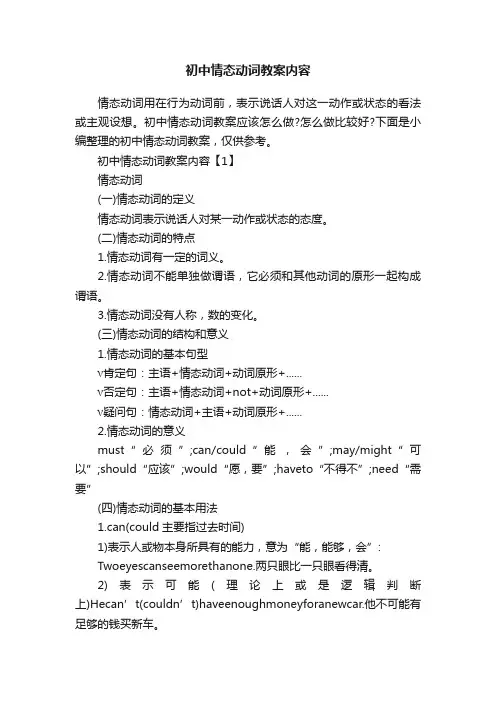
初中情态动词教案内容情态动词用在行为动词前,表示说话人对这一动作或状态的看法或主观设想。
初中情态动词教案应该怎么做?怎么做比较好?下面是小编整理的初中情态动词教案,仅供参考。
初中情态动词教案内容【1】情态动词(一)情态动词的定义情态动词表示说话人对某一动作或状态的态度。
(二)情态动词的特点1.情态动词有一定的词义。
2.情态动词不能单独做谓语,它必须和其他动词的原形一起构成谓语。
3.情态动词没有人称,数的变化。
(三)情态动词的结构和意义1.情态动词的基本句型ν肯定句:主语+情态动词+动词原形+......ν否定句:主语+情态动词+not+动词原形+......ν疑问句:情态动词+主语+动词原形+......2.情态动词的意义must“必须”;can/could“能,会”;may/might“可以”;should“应该”;would“愿,要”;haveto“不得不”;need“需要”(四)情态动词的基本用法1.can(could主要指过去时间)1)表示人或物本身所具有的能力,意为“能,能够,会”:Twoeyescanseemorethanone.两只眼比一只眼看得清。
2)表示可能(理论上或是逻辑判断上)Hecan’t(couldn’t)haveenoughmoneyforanewcar.他不可能有足够的钱买新车。
3)表示允许:初中情态动词教案内容【2】1情态动词的语法特征1)情态动词不能表示正在发生或已经发生的事情,只表示期待或估计某事的发生。
2)情态动词除ought和have外,后面只能接不带to的不定式。
3)情态动词没有人称,数的变化,即情态动词第三人称单数不加-s。
4)情态动词没有非谓语形式,即没有不定式,分词,等形式。
2比较can和beableto1)cancould表示能力;可能(过去时用could),只用于现在式和过去式(could)。
beableto可以用于各种时态。
Theywillbeabletotellyouthenewssoon.他很快就能告诉你消息了。

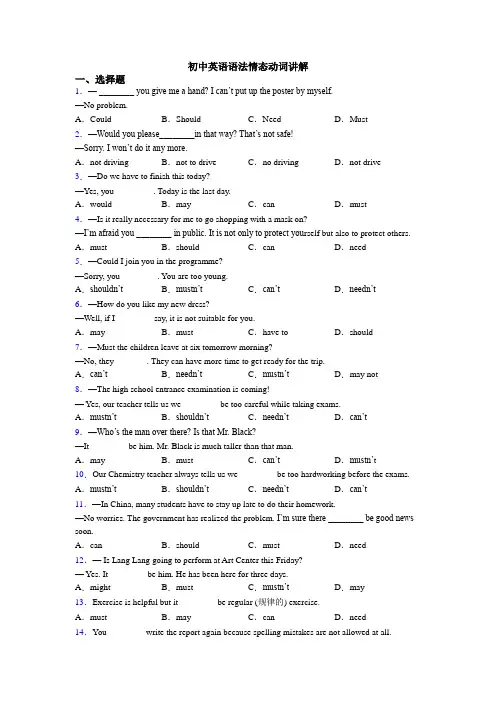
初中英语语法情态动词讲解一、选择题1.—________ you give me a hand? I can’t put up the poster by myself.—No problem.A.Could B.Should C.Need D.Must 2.—Would you please________in that way? That’s not safe!—Sorry. I won’t do it any more.A.not driving B.not to drive C.no driving D.not drive 3.—Do we have to finish this today?—Yes, you ________ . Today is the last day.A.would B.may C.can D.must4.—Is it really necessary for me to go shopping with a mask on?—I’m afraid you ________ in public. It is not only to protect you rself but also to protect others. A.must B.should C.can D.need 5.—Could I join you in the programme?—Sorry, you ________. You are too young.A.shouldn’t B.mustn’t C.can’t D.needn’t 6.—How do you like my new dress?—Well, if I ________ say, it is not suitable for you.A.may B.must C.have to D.should 7.—Must the children leave at six tomorrow morning?—No, they _______. They can have more time to get ready for the trip.A.can’t B.needn’t C.mustn’t D.may not 8.—The high school entrance examination is coming!— Yes, our teacher tells us we ________ be too careful while taking exams.A.mustn’t B.shouldn’t C.needn’t D.can’t 9.—Who’s the man over there? Is that Mr. Black?—It ________ be him. Mr. Black is much taller than that man.A.may B.must C.can’t D.mustn’t10.Our Chemistry teacher always tells us we ________ be too hardworking before the exams. A.mustn’t B.shouldn’t C.needn’t D.can’t11.—In China, many students have to stay up late to do their homework.—No worries. The government has realized the problem. I’m sure there ________ be good news soon.A.can B.should C.must D.need12.— Is Lang Lang going to perform at Art Center this Friday?— Yes. It ________ be him. He has been here for three days.A.might B.must C.mustn’t D.may 13.Exercise is helpful but it ________ be regular (规律的) exercise.A.must B.may C.can D.need14.You ________ write the report again because spelling mistakes are not allowed at all.A.must B.can C.may D.could15.I ________ hear you clearly. Would you please repeat it?A.mustn’t B.can’t C.needn’t D.shouldn’t 16.— Mom, must I clean my room now?— No, you ________. You can do it after dinner.A.needn’t B.mustn’t C.shouldn’t D.can’t17.If you buy your mum an iRobot floor cleaner, she ________ sweep the floor every day. A.can’t B.mustn’t C.ne edn’t D.shouldn’t 18.We’ve discussed every detail of this plan and have got everything ready. But still something __________ go wrong. We still have to be very careful.A.must B.should C.would D.may19.My bike was broken yesterday,so I____walk home.A.might B.had to C.must D.could20.We shouldn’t throw any objects from the building. Even a small object ________ cause serious injuries or death, when dropped from a great height.A.must B.should C.may D.need 21.—Shall I tell him the change of the time right now?—I’m afraid you ________, otherwise he will be late for the meeting.A.can B.may C.must D.need 22.According to the rule, used batteries ________ be dropped in the red bin for harmful wastes. A.may B.would C.should D.might23.— Listen! Tom ________ be listening to the music while doing his homework.—Let’s go upstairs to remind him to turn it off.A.should B.could C.would D.must 24.—Must I finish all my homework today, Mum?—No, you ________, my dear. You can finish some tomorrow if you like.A.needn’t B.shouldn’t C.can’t D.mustn’t25.We've discussed every detail of this plan and have got everything ready. But still something ________ go wrong. We still have to be very careful.A.must B.should C.would D.may 26.—Suzy described every detail of the accident just now.—Her memory ________ be completely back.A.shall B.need C.must D.could27.Most young people like shopping online because they ________ spend much time going from shop to shop.A.needn’t B.can’t C.mustn’t D.shouldn’t 28.—In China, many parents complain that their children have to stay up late to do the homework.—Don’t worry. The government has realized the problem. I’m sure there ________ be good news soon.A.can B.should C.need D.must29.It’s of great importance to protect the environment. Each of us ________ take an active part in it.A.can B.may C.would D.should30.You ________ pay too much attention to protecting yourself if you plan to go abroad. A.mustn’t B.can’t C.shouldn’t D.needn’t 31.—What is that young lady’s job?— She ________ be a nurse, I’m not sure.A.must B.may C.need D.would32.—Will dad arrive home at 6 o’clock to have dinner with us this evening?— I think he will, but he ________ not. Sometimes he works extra hours.A.can B.must C.need D.may33.—Must we stop the Japanese government discharging nuclear waste water (排放核污水) into the Pacific Ocean?—________. Because everyone should protect our earth and it is bad ________ us to eat the polluted seafood and drink the waste water.A.Yes, we can; of B.No, we mustn’t; of C.Yes, we must; for D.No, we needn’t; for 34.Look at the floor, Tom! ________ you watch TV while having a meal?A.Should B.Could C.Must D.May35.— The sandstorm in Beijing is so serious this year.— Yes, I wonder when we ________ worry about the air we breathe.A.can’t B.mustn’t C.needn’t D.shouldn’t 36.—Could you tell me how to renew the library books?—With pleasure. You ________ come to our desk every time. It’s easier to renew them online. A.can’t B.mustn’t C.needn’t D.shouldn’t37.For the safety of the passengers, objects like guns ________ be carried on board.A.may not B.needn’t C.might not D.mustn’t 38.—How beautiful the winter jasmines (迎春花) are!—Yes. These golden-yellow flowers ________ be widely seen in my city in March.A.must B.can C.would D.should39.— What do you think of the show yesterday?— Some of them were really good but others ________ be better.A.will B.must C.need D.can40.—Is it usually warm in Yancheng in May?—Yes. But it _______ be rather cold sometimes.A.must B.should C.would D.can【参考答案】一、选择题1.A解析:A【详解】句意:——你能帮我一把吗?我一个人贴不起海报。
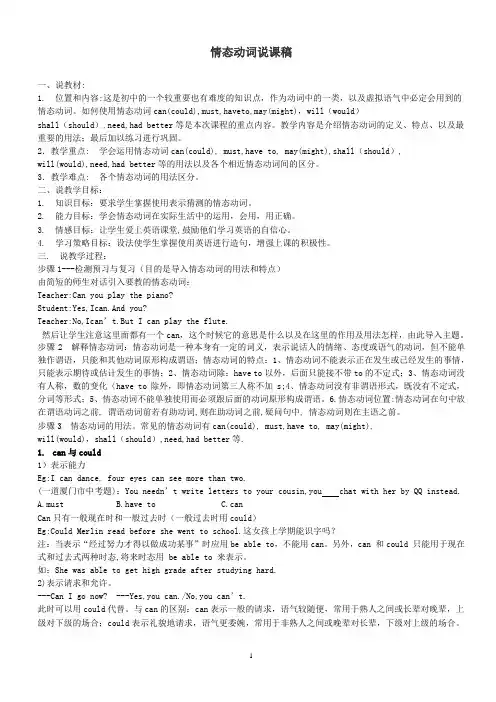
情态动词说课稿一、说教材:1. 位置和内容:这是初中的一个较重要也有难度的知识点,作为动词中的一类,以及虚拟语气中必定会用到的情态动词。
如何使用情态动词can(could),must,haveto,may(might),will(would)shall(should),need,had better等是本次课程的重点内容。
教学内容是介绍情态动词的定义、特点、以及最重要的用法;最后加以练习进行巩固。
2.教学重点: 学会运用情态动词can(could), must,have to, may(might),shall(should),will(would),need,had better等的用法以及各个相近情态动词间的区分。
3.教学难点: 各个情态动词的用法区分。
二、说教学目标:1. 知识目标:要求学生掌握使用表示猜测的情态动词。
2. 能力目标:学会情态动词在实际生活中的运用,会用,用正确。
3. 情感目标:让学生爱上英语课堂,鼓励他们学习英语的自信心。
4. 学习策略目标:设法使学生掌握使用英语进行造句,增强上课的积极性。
三. 说教学过程:步骤1---检测预习与复习(目的是导入情态动词的用法和特点)由简短的师生对话引入要教的情态动词:Teacher:Can you play the piano?Student:Yes,Ican.And you?Teacher:No,Ican’t.But I can play the flute.然后让学生注意这里面都有一个can,这个时候它的意思是什么以及在这里的作用及用法怎样,由此导入主题。
步骤2 解释情态动词:情态动词是一种本身有一定的词义,表示说话人的情绪、态度或语气的动词,但不能单独作谓语,只能和其他动词原形构成谓语;情态动词的特点:1、情态动词不能表示正在发生或已经发生的事情,只能表示期待或估计发生的事情;2、情态动词除:have to以外,后面只能接不带to的不定式;3、情态动词没有人称,数的变化(have to除外,即情态动词第三人称不加s;4、情态动词没有非谓语形式,既没有不定式,分词等形式;5、情态动词不能单独使用而必须跟后面的动词原形构成谓语。
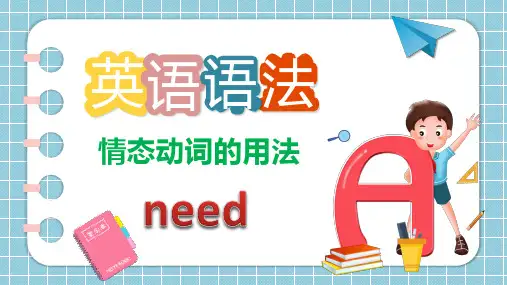
初中英语语法情态动词知识考点试题详解来源:博客2009-04-10 09:26:21[标签:语法情态动词考点试题]对英语教育和学习感兴趣的朋友,来看看我们现行教学中情态动词的内容,14个表情达意的词只在初中就被赋予如此多的解释,我们是否应该想一想,这科学吗?英语母语者要学这么多内容才会用这些词吗?网络知识清单情态动词can 表示能力,意为“能会”表示推测,意为“可能”,常用于否定句和疑问句中表示请求,允许,意为“可以”could can 的过去式,意为“能、会”,表示过去的能力在疑问句中表示委婉请求may 表示请求、许可,意为“可以”表示推测,常用于肯定句中,意为“可能、也许”might may的过去式表示推测,常用于肯定句中,意为“可能、也许”must 表示主观看法,意为“必须、应该”表示有把握的推测,用语肯定句Need 表示需要、必须,主要用于否定句和疑问句中dare 表示敢于,主要用于否定句和疑问句中should 意为“应该”,表示要求和命令表示劝告、建议had better 意为“最好”,表示建议used to 意为“过去常常,表示过去的动作、行为考点知识清单知识梳理情态动词有具体的词义,但也同助动词一样,需要与其他词语一起构成句子的谓语,另外情态动词没哟人称和数的变化,情态动词后必须跟动词原形。
考点一can ,may,must 等情态动词在陈述句中的用法1. can 的用法(1)表示能力、许可、可能性。
表示能力时一般译为“能、会”,即有种能力,尤其是生来具备的能力,此时may 和must 均不可代替它。
如:She can swim fast, but I can’t . 她能游得很快,但我不能。
I can see with my eyes. 我用眼睛看。
(2)表示可能、能够。
如:I can finish it in an hour. 我能在一小时后完成它。
(3)表示许可,常在口语中。
如:You can use my dictionary. 你可以用我的字典。
(4)表示推测,意为“可能”,常用于否定句和疑问句中,此时can’t 译为“不可能”。
如:Can the news be true? 这个消息会是真的吗?----Can it be our teacher?那个人有可能是我们老师吗?----No, it can’t be our teacher. He is on a visit to the Great Wall.不可能。
咱们老师正在游览长城呢。
例--- I think Miss Gao must be in the library. She said she would go there.----- No. She __ be there, I have just been there.A.can’tB.mustn’tC.needn’tD.wouldn’t[解析]根据下文“我刚去过那儿”可知,应为“不可能”,can’t 表示推测[答案] A2. could的用法(1)can的过去式,意为“能、会”,表示过去的能力。
如:He could write poems when he was 10. 他十岁时就会写诗。
(2)could 在疑问句中,表示委婉的语气,此时could 没有过去式的意思。
如:Could you do me a favour? 你能帮我个忙吗?---Could I use your pen? 我能用一下你的钢笔吗?--Yes, you can. 可以。
3. may的用法(1)表示请求、许可,比can 正式,如:May I borrow your bike? 我可以借你的自行车吗?You may go home now. 现在你可以回家了。
例----_______ I borrow your MP3?-----Sure . Here you are.A. MayB.ShouldC.MustD. Would【解析】在此处表示请求,意为“做……可以吗”。
答案A(2) 表示推测,谈论可能性,意为“可能,或许”,一般用于肯定句中。
如:It may rain tomorrow . 明天可能会下雨。
She may be at home. 她可能在家呢.(3) may的过去式为might ,表示推测时。
可能性低于may 。
如:He is away from school. He might be sick.他离开学校了,可能是他生病了。
4. must的用法(1) must 表示主观看法,意为“必须、一定”。
如:You must stay here until I come back.在我回来之前你必须呆在这儿。
Must I hand in my homework right now?我必须现在交作业吗?(2) 其否定形式mustn’t 表示“一定不要”“千万别”“禁止, 不许”. 如:You mustn’t play with fire. 你不许玩火。
You mustn’t be late. 你一定不要迟到。
(3)对must引导的疑问句,肯定回答为must,否定回答为needn’t 或don’t have to .如:---Must I finish my homework?我现在必须完成作业吗?---No, you needn’t.不,你不必。
(4)must 表示有把握的推测,用于肯定句。
如:The light is on, so he must be at home now.灯亮着,他现在肯定在家。
注意其反意问句的构成形式:当must 表示肯定的判断、推测时,其反意疑问句要用实际问句的助动词来构成。
如:She must have finished writing, hasn’t she?她一定已经写完了,不是吗?5. need的用法(1)need 表示需要、必须,主要用于否定句和疑问句中,其否定形式为needn’t ,意为“没有必要,不必”。
用need 提问时,肯定回答为must,否定回答为needn’t 。
如:----Need I stay here any longer? 我还有必要留在这儿吗?----Yes, you must . 是的。
-----No. you needn’t . 不,你不必。
(2) need 还可以作实义动词,此时有人称、数和时态的变化,后边多接动词不定I need to do it right now. 我需要马上做这件事。
He needs to learn more about the girl. 他需要多了解那个女孩。
6. dare 的用法dare意为“敢、敢于”, 用法近似于need,有两种词性:(1)dare 作为情态动词,多用于否定句、疑问句或条件句中,无第三人称单数形式,只有一般现在时和一般过去时。
如:Dare he tell them what he knows?他敢告诉他们所知道的情况吗?I daren’t ask her –will you do it for me?我可不敢问她,你能帮我问问吗?(2)dare 作为实义动词,此时有人称、数及时态的变化。
如:He doesn’t dare to break his promise.他不敢食言。
注意:在口语中,dare 的各种形式常与不带to 的不定式连用。
如:Do you dare tell her what I said?你敢告诉她我说的话吗?I didn’t dare look at him.我不敢看他。
7. shall 的用法(1)shall 表示征求对方意见(多用于第一、三人称),如:Shall we go out for a walk? 我们出去散步好吗?(2) 表示决心、警告、命令(多用于第二、三人称),如:No one shall bring your beepers or mobile phones in the exam.考试中任何人不准带BP机和手机。
8. should的用法(1)should 意为“应该”,可表示劝告、建议、义务、责任等。
如:We should protect the environment. 我们应该保护环境。
(2)should (would)like to do sth. 表示“想要、愿意做某事”,常用于口语中。
如:I should (would) like to go with you . 我愿意和你一起去。
Would you like to go with me? 你想和我一起去吗?(3)Should have done 表示对过去动作的责备、批评。
如:You should have finished your homework.你应该已经完成作业了。
(事实上你没有完成。
)9. will 的用法will表示意愿、意志、打算,可用于多种人称。
如:I will help you if I’m free this afternoon.今天下午如果我有空,我就会帮你。
10. had better 的用法had better 意为“最好”,没有人称的变化,后面接不带to 的不定式,其否定形式为:had better not。
如:We had better go now. 我们最好现在就走。
You had better not give the book to him.你最好不要把这本书给他。
考点二含有情态动词的疑问句1. 由can、may、must构成的疑问句(1)句式:Can/ May/ Must…+ 主语+动词原形+….?如:Can you repair the car? 你会修小汽车吗?Could he be a good student? 他能是名好学生吗?May I borrow your ruler? 我可以借你的尺子吗?Must we clean the room now?我们必须现在打扫房间吗?(2)对may 引出的问句,可以有下列回答方式:Yes, of course.Yes, certainly.Sure .No, you mustn’t.No, you can’t.(3)对must引出的疑问句,回答方式为:Yes, …must.No,…needn’t/ don’t have to.2. will,would,shall 的用法(1)will 在一般疑问句中表示客气的“请求、劝说”。
would 是will 的过去式,语气更加客气、委婉。
如:Would you show me your picture book? 你能让我看看你的画册吗?Will you please give me a call? 请给我打个电话好吗?(2)对will/ would you…的回答方式有以下几种:Yes, I will. (No, I won’t.)Sure . (I’m sorry , I can’t.)All right.Certainly. (No, thank you .)Yes, please.例---Would you do me a favour and pass on my thanks to Lily?-----________.A.That’s rightB.With pleasureC.It doesn’t matterD.No trouble解析 A. 意为“对了”,B. 意为“乐意效劳”, C. 意为“没关系” D.意为“不费事”。